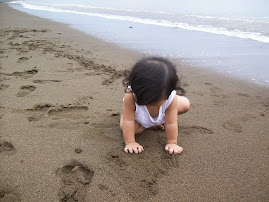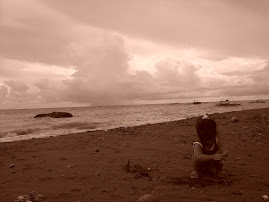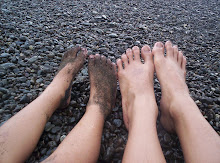On Easter Sunday I decided to go to the market.
My mother-in-law’s house is in a little fishing village with a fantastic beach, and I wanted to go to Infanta, which is two towns away. Its market is huge and the produce is very fresh, and I could fill my laundry basket on a 500-peso budget (as opposed to the same full laundry basket in Cavite at P1,000.00).
I got up at 5:00 am and took pictures of the sun rising in the sea, then started to wait along the highway for an Infanta-bound jeepney by 6:30.
After fifteen minutes the back of my neck was warm with sun, and no jeepney in sight. I started feeling like I had to go to the bathroom, but I had this suspicion that the jeep would pass as soon as I went back to the house. So I waited.
One of my husband’s little nephews soon came to stand by me, and he started to throw pebbles at the highway, where a tricycle or a band of motorcycles would occasionally pass. Twice a group of chickens crossed the road, and how’s that for a joke? I started wanting to throw pebbles too.
After a 45-minute wait, a jeep came along. It was almost full, but you don’t know what a full jeep means in a provincial highway. I boarded, and in the middle of the jeep were two huge sacks of what looked like giant sweet potatoes. There was a spare wheel for the jeep, and assorted boxes and luggages of the passengers. There were about a dozen kids, sleeping on laps and sitting on the sacks. I got wedged between a man who was clutching a basket of pastillas and another who was clutching a bunch of brooms. My feet were up on the sack of sweet potatoes, and my basket was between my legs. My knees were almost to my chin, and the brooms were tickling my right ear. Lesson Number One: Wear a dress on a jeep ride like this, and you're risking a major scandal.
After about a kilometer, the jeep stopped to unload passengers… from the roof. Down they came, men with sacks and some coconuts. They lifted down a dog too, who, with his tongue out and his eyes sparkling, looked like he had the ride of his life. Or maybe he did it everyday.
Then the jeep wouldn’t start. The driver got out to tinker with the engine, and the passengers started to chat. Across me sat two old women who were loudly exchanging notes on raising grandchildren. One of them was wearing blue knee-length pants studded with sequins, and over it a blouse with a riot of Hawaiian flowers. She had dangling earrings. She gestured wildly. She crossed her legs, and I noted that on her feet were orange Havaianas, properly misspelled. Oh, I love funky grandmothers!
Nobody seemed to be in a hurry. It looked like my trip to the market would take me the whole morning, when I could do it in an hour back home. Lesson Number Two: Forget that time is gold. Enjoy the trip since everyone seems to be doing just that.
After a while we moved again, and we reached the first town. Now we really had to stop. The sacks of sweet potatoes would be unloaded. We had already learned that they would be made into camote cue, and that the supply would last a week, and that it was a delivery, meaning the owner wasn’t with us but already waiting for the sweet potatoes since early morning. But since everyone was practically sitting on them, half of the passengers had to get off, along with their luggages, so that the sacks could be pulled out. The other half had to lift their feet even higher (and I thanked God again I was wearing shorts).
Oh, and did I mention that the passengers don’t pay as soon as they board the jeep? They pay the driver when they get off, so we have to wait while the driver counts out the change or, on one occasion, had to dash off to a sari-sari store to exchange smaller bills. And the people continued talking. Some of the women would offer to seat the smaller children on their laps; some were exchanging opinions on the merits of plastic flowers; and the grandmother in the blue sequined pants had progressed to the food she would serve in her house during the Infanta town fiesta the following day. She still had her legs crossed.
I got to Infanta after an hour and 15 minutes, on a trip that took about thirty minutes in a car. Everybody smiled when they got off the jeep. I’ve never had a more interesting time. I was sure I could finish raiding the market in about half an hour, but I was even more sure that I would get back to the house by noon.
And that the trip back would be worth another blog.
Monday, April 25, 2011
...and on the way back.
I told you it would take another blog.
This is what I love in little towns. People are so involved in each other’s lives that they could not resist the chance to talk to each other, when they met on the streets, when they bought fish, when they rode on jeeps.
The tricycle driver noted the results of my trip to the market, and he inquired how much I bought the Indian mangoes for. I said P20 per kilo (and I was proud of it). He mournfully shook his head and offered his opinion on where I could have gotten fresher mangoes at 15 pesos per kilo. He lifted my basket and took me to the right jeep. The driver’s assistant positioned my basket in the middle and reminded me not to sit too far in front, since my destination was closer.
The jeep mercifully left after fifteen minutes of waiting for passengers. I saw the other passengers looking me over shamelessly, so I checked them out too. It was certainly more interesting than my rides to the office, where the office girls and boys slept all the way to Ortigas, and the only means of entertainment was to wonder whether the bank employee beside me was carrying an authentic Louis Vuitton bag, and to count how many were not wearing earphones.
Beside me was a teenager. She had a bag, but she chose to hold her two cellphones, a comb, and a handkerchief in one hand. She was texting on the cellphones alternately, and smiling as she did it. Said teenager would later forget where was supposed to get off, and would squeal for the driver to stop when she realized she was past her destination. The older men would laugh at the folly of owning cellphones when she was gone. I dared not check my cellphone.
I wonder why there are so many kids in these jeep rides. There was a mother across me with three little kids. She was breastfeeding the fourth. All three kids, I presumed, weren’t paying passengers. As the jeep stopped to pick up more passengers along the way, the children were asked to give up their seats, one by one. They did, and they either sat on the jeepney floor, or on one of their bags, or on another person’s lap if it was offered.
Farther along the seat was another baby, who was gleefully plucking the leaves of some vegetables from another passenger’s basket and eating them, while his mother chatted with the basket’s owner. While I was doubtful about the benefit of raw pechay leaves on the baby’s digestion, I was sure the other woman did not mind cooking shredded vegetables.
Two little boys got on. I guessed they were about five and eight, or maybe they’re small for their age. They each had a small bundle of firewood, which the older one said they were selling in the next barangay. One of the relatively well-dressed men on the jeep (well, he had shoes), clucked and offered to pay for their fare. An old woman who was eating bread gave some of it to the smaller boy. He kept his eyes down but said thank you. I felt like applauding.
One rather pretty young girl got on. She smiled at everyone, and when she was paying her fare a brash young man proclaimed that she should get a free ride, on account of being pretty. The driver, an old man, looked at us from his rearview mirror, smiled, and obliged.
And of course there were the grandmothers, who saw everything and gave their opinion and nodded approval in all the right places as the conversations eddied around them. I think it’s mainly these old women who anchor the jeep rides in their places for me, with their calm faces, unselfconscious words, and expansive moods. The presence of old women in the jeep tells me that there is no need to hurry, I’ve been there, done that, life is indeed tough, so let the jeep take us where we want to go and in the meantime let’s enjoy each other. You can breastfeed your kid, you can text on all three cellphones if you have them, you can wear blue sequined pants and misspelled Havaianas and to hell with whoever noticed, but we’ll get there when we get there. (Or maybe I'm fixated with grandmothers.)
I’m sure jeep rides in that place aren’t always so pleasant. As in other places, there would be drunk passengers, or passengers who argue with the driver about the fare, or jeeps being held up by thieves. Maybe I got lucky, it being Easter Sunday and all.
At the end of that day I would be heading back to my ordinary life in the city, but at that particular time, with a basket full of fruits and vegetables, wearing muddy slippers instead of high heels, not worrying about reports and documents for signature, the jeep was a happy place to be.
This is what I love in little towns. People are so involved in each other’s lives that they could not resist the chance to talk to each other, when they met on the streets, when they bought fish, when they rode on jeeps.
The tricycle driver noted the results of my trip to the market, and he inquired how much I bought the Indian mangoes for. I said P20 per kilo (and I was proud of it). He mournfully shook his head and offered his opinion on where I could have gotten fresher mangoes at 15 pesos per kilo. He lifted my basket and took me to the right jeep. The driver’s assistant positioned my basket in the middle and reminded me not to sit too far in front, since my destination was closer.
The jeep mercifully left after fifteen minutes of waiting for passengers. I saw the other passengers looking me over shamelessly, so I checked them out too. It was certainly more interesting than my rides to the office, where the office girls and boys slept all the way to Ortigas, and the only means of entertainment was to wonder whether the bank employee beside me was carrying an authentic Louis Vuitton bag, and to count how many were not wearing earphones.
Beside me was a teenager. She had a bag, but she chose to hold her two cellphones, a comb, and a handkerchief in one hand. She was texting on the cellphones alternately, and smiling as she did it. Said teenager would later forget where was supposed to get off, and would squeal for the driver to stop when she realized she was past her destination. The older men would laugh at the folly of owning cellphones when she was gone. I dared not check my cellphone.
I wonder why there are so many kids in these jeep rides. There was a mother across me with three little kids. She was breastfeeding the fourth. All three kids, I presumed, weren’t paying passengers. As the jeep stopped to pick up more passengers along the way, the children were asked to give up their seats, one by one. They did, and they either sat on the jeepney floor, or on one of their bags, or on another person’s lap if it was offered.
Farther along the seat was another baby, who was gleefully plucking the leaves of some vegetables from another passenger’s basket and eating them, while his mother chatted with the basket’s owner. While I was doubtful about the benefit of raw pechay leaves on the baby’s digestion, I was sure the other woman did not mind cooking shredded vegetables.
Two little boys got on. I guessed they were about five and eight, or maybe they’re small for their age. They each had a small bundle of firewood, which the older one said they were selling in the next barangay. One of the relatively well-dressed men on the jeep (well, he had shoes), clucked and offered to pay for their fare. An old woman who was eating bread gave some of it to the smaller boy. He kept his eyes down but said thank you. I felt like applauding.
One rather pretty young girl got on. She smiled at everyone, and when she was paying her fare a brash young man proclaimed that she should get a free ride, on account of being pretty. The driver, an old man, looked at us from his rearview mirror, smiled, and obliged.
And of course there were the grandmothers, who saw everything and gave their opinion and nodded approval in all the right places as the conversations eddied around them. I think it’s mainly these old women who anchor the jeep rides in their places for me, with their calm faces, unselfconscious words, and expansive moods. The presence of old women in the jeep tells me that there is no need to hurry, I’ve been there, done that, life is indeed tough, so let the jeep take us where we want to go and in the meantime let’s enjoy each other. You can breastfeed your kid, you can text on all three cellphones if you have them, you can wear blue sequined pants and misspelled Havaianas and to hell with whoever noticed, but we’ll get there when we get there. (Or maybe I'm fixated with grandmothers.)
I’m sure jeep rides in that place aren’t always so pleasant. As in other places, there would be drunk passengers, or passengers who argue with the driver about the fare, or jeeps being held up by thieves. Maybe I got lucky, it being Easter Sunday and all.
At the end of that day I would be heading back to my ordinary life in the city, but at that particular time, with a basket full of fruits and vegetables, wearing muddy slippers instead of high heels, not worrying about reports and documents for signature, the jeep was a happy place to be.
Friday, April 15, 2011
fate or choice?
Antonio drove a van for a shuttle service. He was a relatively new driver; been there for only a few months. And although his van was often hot and problematic, he was usually courteous and cheerful.
But because of a pending issue with his membership fee, he had to discontinue driving for a while. It was expected that he would return.
After a couple of weeks with nothing to do, he teamed up with a motorcycle-riding buddy and snatched bags from unsuspecting women waiting for a ride: the famed riding-in-tandem snatcher modus operandi.
One night, they snatched the bag of an old woman by the highway. It should have been easy: women mostly held their bags loosely, and they couldn’t chase you. But the old woman held on to the bag, and Antonio was pulled off the motorcycle. He fell, and he hit the old woman to make her let go of the bag. The he mounted the motorcycle again and they sped off.
The bag had no money. He threw it away and they rode on. After a while, for some reason or another, Antonio asked his buddy to turn back.
Antonio returned to the bag he had thrown on the roadside, while his motorcycle buddy stayed a prudent distance away. And while he was busy, the townspeople came, carrying weapons. Antonio ran. The open land on both sides of the highway was very dark, dotted with trees, and covered in tall grass. The riding buddy heard a couple of shots, and he went away. After a while Antonio’s phone would just keep ringing.
The following morning Antonio’s friends started going around the police stations to find out if the robbery—or the possible lynching of Antonio—had been reported. It was not. On the fourth day someone tipped off the family that a body had been found in another place, far from where Antonio was chased down. So the family started checking the funeral parlors.
And they found Antonio. His body had been discovered on the side of another highway the morning after he disappeared, a short distance from a police station that they had checked before. He was shot several times—all in the back of the head. The mortician tried to repair his face with wax and makeup, but it was misshapen and still bulged in the wrong places.
There was no blotter report in any police station of a body being found. There was no case.
At the wake, you could hear the whispered conversations. The woman who was grieving was not the wife but the girlfriend, and it was she who would not stop searching until he was found. The wife was abroad, and he had a son. The riding buddy was still around, and do you think he would just get another partner and go on snatching bags merrily?
Some say Antonio didn’t have too many breaks, and life had not been kind. Some said not everyone who faced the prospect of unemployment became outlaws. And still some shook their head and said that in Cavite, justice was often swift, and nameless, and silent.
Antonio was buried yesterday, along with his van-driving days and his hopes for a good life. And the circumstances of his death would be just a story told in the future, on nights when his former friends would drink beer and wonder whether his fate was sealed that night, or if he could have made another choice and lived.
But because of a pending issue with his membership fee, he had to discontinue driving for a while. It was expected that he would return.
After a couple of weeks with nothing to do, he teamed up with a motorcycle-riding buddy and snatched bags from unsuspecting women waiting for a ride: the famed riding-in-tandem snatcher modus operandi.
One night, they snatched the bag of an old woman by the highway. It should have been easy: women mostly held their bags loosely, and they couldn’t chase you. But the old woman held on to the bag, and Antonio was pulled off the motorcycle. He fell, and he hit the old woman to make her let go of the bag. The he mounted the motorcycle again and they sped off.
The bag had no money. He threw it away and they rode on. After a while, for some reason or another, Antonio asked his buddy to turn back.
Antonio returned to the bag he had thrown on the roadside, while his motorcycle buddy stayed a prudent distance away. And while he was busy, the townspeople came, carrying weapons. Antonio ran. The open land on both sides of the highway was very dark, dotted with trees, and covered in tall grass. The riding buddy heard a couple of shots, and he went away. After a while Antonio’s phone would just keep ringing.
The following morning Antonio’s friends started going around the police stations to find out if the robbery—or the possible lynching of Antonio—had been reported. It was not. On the fourth day someone tipped off the family that a body had been found in another place, far from where Antonio was chased down. So the family started checking the funeral parlors.
And they found Antonio. His body had been discovered on the side of another highway the morning after he disappeared, a short distance from a police station that they had checked before. He was shot several times—all in the back of the head. The mortician tried to repair his face with wax and makeup, but it was misshapen and still bulged in the wrong places.
There was no blotter report in any police station of a body being found. There was no case.
At the wake, you could hear the whispered conversations. The woman who was grieving was not the wife but the girlfriend, and it was she who would not stop searching until he was found. The wife was abroad, and he had a son. The riding buddy was still around, and do you think he would just get another partner and go on snatching bags merrily?
Some say Antonio didn’t have too many breaks, and life had not been kind. Some said not everyone who faced the prospect of unemployment became outlaws. And still some shook their head and said that in Cavite, justice was often swift, and nameless, and silent.
Antonio was buried yesterday, along with his van-driving days and his hopes for a good life. And the circumstances of his death would be just a story told in the future, on nights when his former friends would drink beer and wonder whether his fate was sealed that night, or if he could have made another choice and lived.
Subscribe to:
Posts (Atom)



















